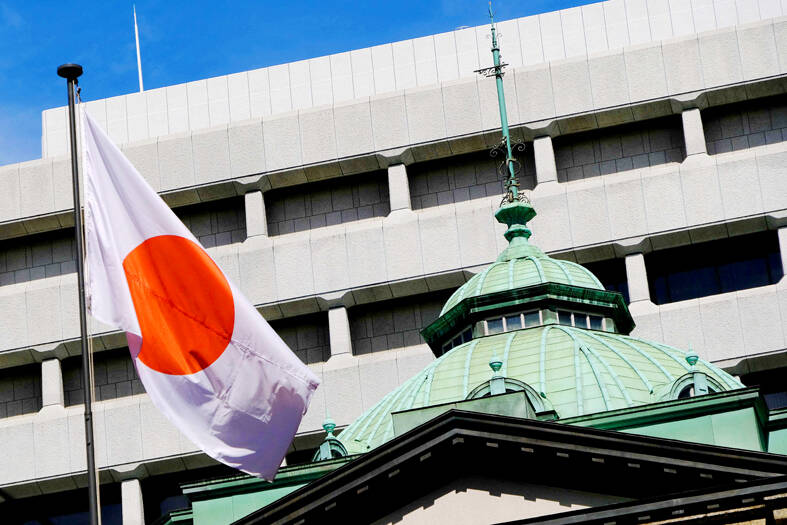The Bank of Japan (BOJ) continued to stand by its ultra-low interest rates as it further isolated itself from a global wave of policy tightening, fueling a slide in the yen to a fresh 24-year low and ramped-up warnings of possible intervention.
Within hours of the US Federal Reserve’s latest rate hike, BOJ Governor Haruhiko Kuroda and his fellow board members kept the bank’s yield curve control program and its asset purchases unchanged yesterday as had been widely expected.
The decision still pushed the yen to as weak as ¥145.37 against the US dollar, prompting a stronger warning from Japan’s top currency official.

Photo: AFP
“We could do a stealth intervention, and even though I’m not in a position to comment on whether an intervention was done or not, honestly speaking, we haven’t done it yet,” Japanese Vice Minister of Finance for International Affairs Masato Kanda said after the yen had pared back some of the lost ground.
The yen’s descent brings it within striking distance of the ¥146.78 level where the authorities last stepped in to prop it up in 1998.
Hedge funds have been adding to bearish bets on the currency, which has tumbled more than 20 percent this year, with Goldman Sachs Group Inc warning it could decline to ¥155.
Kanda’s remarks came after the BOJ decision showed Kuroda’s determination to stand his ground, even at the cost of further falls in Japan’s currency and more bond buying to defend a cap on bond yields.
The governor has repeatedly signaled that there is a long way to go before policy in Japan can be normalized. In sharp contrast with the Fed’s aggressive rate increases, the BOJ’s forward guidance is flagging the possibility of rates going lower, not higher.
Kuroda has so far clearly ruled out the policy adjustments to stop the yen’s slide. He has repeatedly said the economy needs monetary stimulus until higher wage gains can make the cost-push inflation sustainable.
That means the BOJ is sticking with its short-term interest rate of minus-0.1 percent and its cap on long-term bond yields. In the past week, the central bank has spent about ¥2.9 trillion (US$20.3 billion) on fixed-rate purchases of bonds to defend the 0.25 percent cap.
While daily purchases have been required again after a lull of more than two months, that amount is less than half the ¥7.5 trillion the central bank forked out on purchases in the five days up to its June decision.

Vincent Wei led fellow Singaporean farmers around an empty Malaysian plot, laying out plans for a greenhouse and rows of leafy vegetables. What he pitched was not just space for crops, but a lifeline for growers struggling to make ends meet in a city-state with high prices and little vacant land. The future agriculture hub is part of a joint special economic zone launched last year by the two neighbors, expected to cost US$123 million and produce 10,000 tonnes of fresh produce annually. It is attracting Singaporean farmers with promises of cheaper land, labor and energy just over the border.

US actor Matthew McConaughey has filed recordings of his image and voice with US patent authorities to protect them from unauthorized usage by artificial intelligence (AI) platforms, a representative said earlier this week. Several video clips and audio recordings were registered by the commercial arm of the Just Keep Livin’ Foundation, a non-profit created by the Oscar-winning actor and his wife, Camila, according to the US Patent and Trademark Office database. Many artists are increasingly concerned about the uncontrolled use of their image via generative AI since the rollout of ChatGPT and other AI-powered tools. Several US states have adopted

KEEPING UP: The acquisition of a cleanroom in Taiwan would enable Micron to increase production in a market where demand continues to outpace supply, a Micron official said Micron Technology Inc has signed a letter of intent to buy a fabrication site in Taiwan from Powerchip Semiconductor Manufacturing Corp (力積電) for US$1.8 billion to expand its production of memory chips. Micron would take control of the P5 site in Miaoli County’s Tongluo Township (銅鑼) and plans to ramp up DRAM production in phases after the transaction closes in the second quarter, the company said in a statement on Saturday. The acquisition includes an existing 12 inch fab cleanroom of 27,871m2 and would further position Micron to address growing global demand for memory solutions, the company said. Micron expects the transaction to

A proposed billionaires’ tax in California has ignited a political uproar in Silicon Valley, with tech titans threatening to leave the state while California Governor Gavin Newsom of the Democratic Party maneuvers to defeat a levy that he fears would lead to an exodus of wealth. A technology mecca, California has more billionaires than any other US state — a few hundred, by some estimates. About half its personal income tax revenue, a financial backbone in the nearly US$350 billion budget, comes from the top 1 percent of earners. A large healthcare union is attempting to place a proposal before